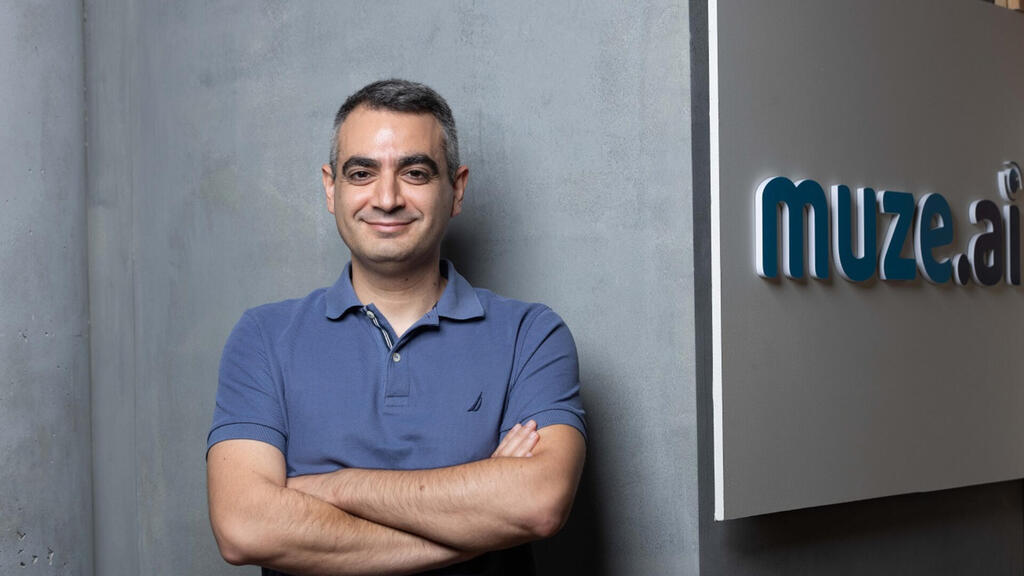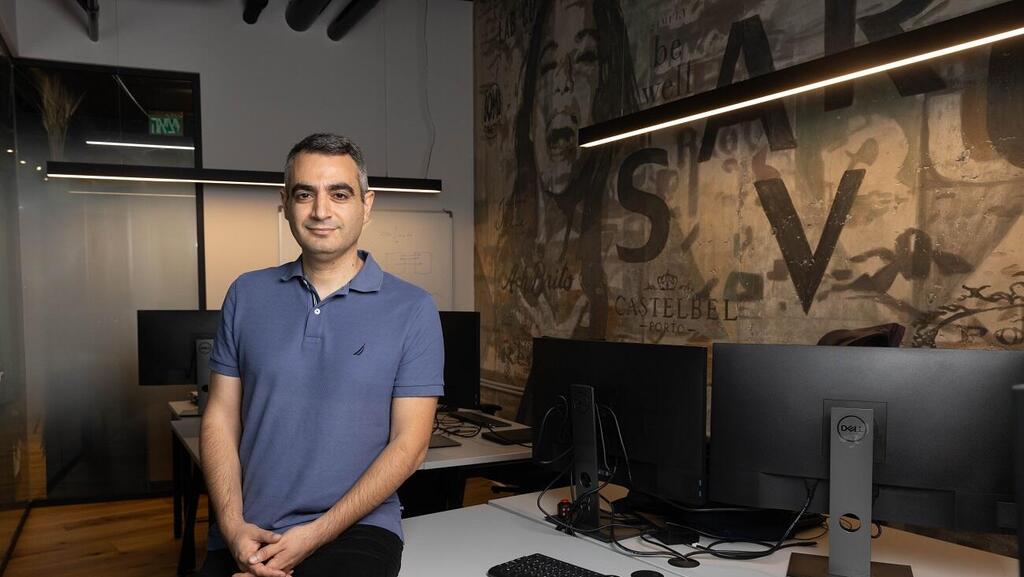Getting your Trinity Audio player ready...
Udi Danino sold a company to Ford World, celebrated an exit that made headlines on the financial pages and ranks among Israeli hi-tech’s most respected characters. But it’s in the small world of Tel Aviv University that he feels he’s living the dream.
Read more:
“I was at an event two months ago when OpenAI CEO, Sam Altman was visiting Israel. The audience was as excited as if Britney Spears had taken the stage. I thought to myself ‘What kind of world are we living in where algorithm developers are the new rock stars? They’re as geeky as they come. Amazing. I’m in the right profession. The justified hype surrounding AI and what it will do for humanity puts us in a place where we feel part of something huge.”
For the people at SAIPS, it was a sign to start something new. They set up “Muze AI” which provides algorithm development services to organizations solving extremely complex AI problems. “Extremely complex” also describes Danino’s decisions as an entrepreneur. His company is based on services rather than products; he self-financed his companies without external investors; his companies are based on profits rather than growth and he is sure to spend his time in unchartered waters. No wonder he feels a little like Briteny Spears.
“I like working at the highest levels of everything I do – in terms of the kind of tasks I take on, and in terms of the people who challenge me intellectually. That’s what I’m good at. I’m not building a battalion. I’m building an elite unit – a small, world-class team. The DNA of the companies we’ve built is that of small teams of the top percentile of the country’s algorithm people. Recruitment involves blood, sweat and tears. You have to create challenging tasks for people like this. They won’t stay if you don’t.“
Danino (42) can definitely prove he’s in the right place. Raised in Ami’oz – a southern moshav in the Eshkol region - he’s religious and is the ninth child of a farmer father and a housewife mother. He began his Bachelor’s degree in Electronic Engineering and Computer Science at the age of 18 and became the first CEO of SAIPS that, in 2016, was sold to automotive giant, Ford. The purchase, valued at tens of millions of dollars, granted Danino and his partners, Noga Zieber (chief engineer) and Rotem Littman (chief technology officer) heads of Ford’s development center in Israel - key positions in a company developing technology for autonomous (self-driving) cars. They’re competing in the race for development against Eilon Musk at Tesla, Google’s “Waymo”, Uber, and Israeli companies “Mobileye” and “Innoviz”. But when the auto-tech industry’s optimistic forecasts turned somewhat less optimistic, Ford shut down its autonomous vehicle initiative, “Argo.”
According to industry estimates, annual salaries for algorithm engineers at Muze AI reach an average of a million shekels – a figure considered exceptionally high, especially in light of the current crisis within the industry. The recruitment process is its own challenge considering the shortage of algorithm engineers in the country. “We’re talking about a few thousand. Our recruitment stands at one in 350 resumés we receive. Picking the right person out of all these resumés is like finding a needle in a haystack. We mean it when we say we’re building an elite unit. I personally spend about a third of my time on recruitment."
Who’s your dream candidate?
“The profile is one of outstanding talent. It’s hard to define but easy to recognize when you see it. An autodidact who thinks up his or her own creative solutions – and not at the level of checking on GitHub or in the literature. Most of our people have Master's Degrees or more. For this talent, we’re competing against the world’s Googles, Facebook and Amazon as well as mature startups.”
And how much can you pay this talent without huge investment behind you ?
“We solve our clients’ most difficult problems. Accordingly, money isn’t the issue in these cases and it allows us to pay our employees market rate and above. Intelligent people like working with other intelligent people. Our workers aren’t asking themselves where they’re going next.
Sam Altman has said that he doesn’t sleep at night because of the potential dangers of AI. Do you share these concerns?
“I’m concerned about more genuine problems than robots annihilating society. I have the feeling that the Silicone Valley geeks have been watching too much science fiction “ he jokes. I’m more concerned about the job market. I’m sure that the next big thing is OpenAI. Google and Meta are working on very strong video models. Think of a small business owner who wants to create an ad – they can create the script using ChatGPT, the music on instruments recently produced by Google and they can create the visual part on video. It’s not far off and it’ll make advertising companies and creative people obsolete. It's not a decade away. It’s in a few years’ time. Cyber attacks will improve and companies will have to pay huge sums to protect themselves – in turn rolling over the cost to the customer. And the impact on western democracies - everything from Deep Fake through to the most basic ability to create an infinite amount of content to serve various agenda - will flood social media.”
He lives in Rehovot with his wife, a Biology PhD candidate at the Weizmann Institute, and their four children aged five to fourteen. In an alternative universe, he tells us, he would be a film director. Danino isn’t the sort to follow the crowd. Even when it comes to the judicial overhaul and as the industry closes ranks against it. Where Danino comes from, comes into play: “I grew up in the south of the country on a moshav founded by immigrants from Morocco. As there weren’t any good religious schools in the area, I left home at 12 and went to live at a boarding school. There were no CEOs around me. Everyone was from framing families and when a child sees things around him, it’s only natural that he would grow up to be that. When the desert development town of Ofakim is the biggest city nearby, you’re not aspiring to get into Harvard. "
Who did you aspire to be like? Who were your earliest role models?
“When I first started at university, I met people like the son of Yishayahu Leibowitz. As a boy from a moshav, I’d only ever met farmers. Now, I was with Elia Leibowitz – an outstandingly impressive and clever human being. A spectrum of opportunities opened up for me there. But as to how did I ever get there? A great deal of luck and a lot of hard work. In the army, I’d finish at five and would go to work until midnight almost every day. I’m the only member of my family in hi-tech, but almost all my siblings are academics and lawyers – one of my brothers is a district judge. Our parents were special and education was the most important thing for them. That was unusual. I’m glad I had the childhood I did, but when I look back and think about the children growing up in development towns, so many of them aren’t making use of even a fraction of their talent.”
Danino also doesn’t shy away from sectarian issues – or from minority representation, women and Mizrachim in hi-tech. “I’m sorry to say that I don’t know of any diversity in hi-tech. It’s very homogeneous. The overwhelming majority are of European decent, from a very particular socio-economic background. Two-thirds are men and there are almost no Arabs or Haultra-Orthodox. Very few people who look like me – religious from a Sephardic family, and they are definitely not in leading positions.
Has your ethnic background held you back in your career?
“I’ve never thought that my family name has held me back, but your spectrum of opportunities is different. A boy from a suburb of Tel Aviv, even if his abilities and motivation are mediocre, will do well in life. He’ll complete a degree, and then another one and he’ll get a job in hi-tech. His path is paved for success. You have to do something drastic to not succeed. In places like where I was raised, you have to make enormous efforts. These people are invisible to Israeli society and if we’re talking about the side that supports judicial reform, much of its motivation comes from this. Judicial reform is an excuse to express all the pain of identity, missed opportunity and the arrogance you face. I understand the deep pain on both sides, but judicial reform isn’t what we should be focusing on. I don’t demonstrate, but some of the workers here do and I applaud and respect them for that. “
Danino left Israel’s Ford R& D center when the company made strategic changes in its autonomous vehicle activities: After investing $3.6 billion a year ago “Argo”, which was jointly owned by Ford and Volkswagen, was closed. Ford CEO, Jim Farley explained that realizing the autonomous vehicle vision was further off than believed. “We first encountered the field of autonomous vehicles while working with Ford and we understood its complexity,” Danino tells us. “Facing almost any problem in the real world, if you reach a solution that’s 90-95%, it's good enough. You worked hard. Everyone’s happy. But when it comes to autonomous cars, it has to be 99% with a lot of point nines after that. It’s a matter of life and death.
How do you start working on an autonomous vehicle ?
“It divides into three parts,” Danino tells us: “Building a static map of the world that excludes any dynamic objects such as cars, animals or pedestrians. It happens offline before you get on the road- to give the vehicle as much information as possible about its surroundings.”
“You then identify objects in challenging situations – like a child hiding behind a truck with his foot sticking out. It gets complicated because you have to identify the foot and also follow it. Then, once the vehicle understands what’s going on around it, it needs to make decisions. It must decide what to do with the pedals and the steering wheel. Most of the innovation technology goes into this.”
“When you factor in all of this, you understand why the car manufacturers' initial predictions found themselves run over in the street. 2021 was cited as the year that Ford would launch autonomous vehicles that would drive around cities with no steering wheels, pedals or drivers – what is known in the industry as ‘stage four’. To Ford’s credit, the company wasn’t party to this prediction race and was much more cautious, saying this was a soft target date to which they are not necessarily committed” says Danino. “At Ford, they weren’t expecting thousands of autonomous vehicles to be driving around Europe and the United States, but lots of other players did cite this as their target date – and it harmed the industry. As the years went by and nothing happened, it damaged the credibility of the automotive industry.”
Israeli companies like Mobileye and Innoviz play important role in this industry
“Mobileye took a step back during stage four. After making headlines about being able to meet their 2022 target, they realized it would not happen. I think the whole industry has developed and matured has understood what’s possible and what isn’t.”
Did you yourself believe it could be done?
“I didn’t, but it’s very complicated. In the United States, they already have models that allow you to drive thousands of miles without using your hands or feet and anyone is free to go and buy one. They don’t come cheap, but that’s another matter. The driver, however, does need to be fully attentive when this feature is operated. It definitely relieves the cognitive efforts that go into driving, but it doesn’t buy you time. It’s suitable for drivers overseas who drive on highways or a person taking a 45-minute drive to work and back in traffic jams. Useful, but not the great leap we were expecting. The industry is now focusing on allowing the driver to take their eyes off the road in certain scenarios – like the American worker’s daily commute as he’s fiddling with his phone or playing with the children. You have autonomy, you have pedals, but the driver needs to be available for the system at a few seconds’ warning if it needs his attention. This is a reasonable goal for the coming years. Completing stage four – a car with no steering wheel, pedals or driver that drives around complex urban areas – I don’t see that happening in the coming decade.”
Because of technology that hasn’t been fully developed or because of regulation?
“The problem is primarily in the technology. I think the moment the technology is ready, regulation won’t be what stops autonomous vehicles.”
Did the fact that you weren’t fully assimilated into Ford, a company with 200 thousand employees, help you?
“We very much insisted on maintaining the complete independence of our activities. If you were to walk into the SAIPS offices after the acquisition, you’d never know you were at Ford. I’ve heard horror stories from friends who were bought out by corporations who just trampled all over their startups. It’s very hard to fully assimilate into a corporation. Ford behaved very wisely in their dealings with us.”
In retrospect, for Ford, was it the right acquisition? The project was ultimately scaled back
“They view it as a great success story. Ford's CEO described the acquisition of SAIPS as among Ford’s best deals over the past decade. Although stage four didn’t make it onto the streets, lower-level autonomy systems have been successful, and that’s of dramatic value to the company. “
Muze AI, an AI company founded last January, employs ten people. “We deal with image-based biometric identification and we’ll soon embark on a new project in heavy industry. Just imagine autonomous lawnmowers, a much simpler autonomous vehicle. We’ll expand into more industries and we’ll recruit more people.”
Once again, Danino wasn’t involved in the recruitment of investors and founded his own private company. “I had a lot of offers, including one from the late Zohar Zispal who was with SAIPS from the very start. If there’s an investment offer that I’m sorry I didn’t take, it’s his. We had been in touch for many years and he was a kind of mentor for us. Whenever we had to make a difficult decision, we’d turn to him. But at the end of the day, we love our independence, and we’ve built a business model that doesn’t require investment. The company only needed a very small sum that I put up myself at the beginning. This cycle, of creating a bubble and repeatedly taking out the hot air – it makes no sense that people don’t learn from it.“
Is this also right for AI startups?
“Today, anything that even smells of AI is valued absurdly high. I’ve met a lot of investors and at Ford, I founded the innovation center that served as a bridge between the huge mothership from Detroit and Autotech Israel. There, to bring Israeli technology to Ford products, I was exposed to a lot of startups. We saw how the bubble was inflated: We saw ephemeral startups valued at sums that made no sense, and we watched them ultimately collapse. “
Maybe you just prefer moderate risks?
“Yes. It’s also a question about how much you like risk. Service companies almost never have a downside. Our value won’t crash by 80% overnight. Yes, the figures are different, but if I’m gifted with one trait, it’s that I’m not greedy. Thank goodness, I have enough for my children for the rest of our lives and we don’t do what we do because we love money. If I had another zero on the end of my bank balance, it wouldn’t change my lifestyle in any way. All three of us partners are the same. We’re clearly in business, and your value is gauged in dollars, but it’s important that your daily life is fun.“
You became an entrepreneur after seven years at the Applied Materials corporation. Why did you choose to build a company that provides services rather than develops a product?
“It was a tough decision to make. SPAIS and Muze AI are very different from most Israeli companies. It’s about very challenging problems. The business model of both my previous and present companies is that companies from a wide range of industries including medicine, retail, gaming and semiconductors, approach us when they have a difficult problem that they can’t solve in-house. Instead of settling into one specific niche, we like a broader vision and do not rely on one hard problem. If you build up a world-class team, you can also build a very good business.”
What kind of problems?
“We have a very interesting client involved in semiconductors which solves a problem that looks very dull on paper. They take a chip and find its faults. This is an action that can have a huge impact on the industry and is worth trillions. We found an innovative way to solve the problem with AI in a place where they thought AI wasn’t applicable. It significantly improved performance.”
Danino points out that there’s a tendency in Israeli hi-tech to develop startups that rely on the existing infrastructure models of companies such as Google and DeepMind instead of developing foundation models themselves: “Companies that develop the foundation model themselves are valued to crazy amounts. In this case, it’s justified. A company that comes up with a ‘secret sauce’ in infrastructure is worth every invested dollar. OpenAI is a good example and Israel’s closest equivalent is AI21 Labs. With a strong foundation development, the potential is endless as are the uses for so many industries. I think the problem is that Israeli entrepreneurs are drawn to the easy solution which is using other foundation models to develop apps. In Israel, they don’t try hard enough to address the core questions of how to create such a model and how to stop it imagining answers detached from reality. If the Israeli industry really wants to take a serious foothold in world of AI, it has to play in this field.”
if they don't, will we have no cutting edge in any field?
“Precisely. The opposite example is cyber. It’s a field that developed out of the military with the depth of years of hard work that could not base itself on foreign developments because it all has to be developed within the IDF. Israeli infrastructure for cyber security is very strong and we all benefit. In AI, that’s not the case. The IDF isn’t good enough at this and no great AI capabilities flow out from it.”
What steps must the government take for Israel to play in this field?
“I think they should establish a government research institute and budget it. They should bring in strong management and make things happen - clearly not under government management, but with government funding. They should also encourage such initiatives with state investment and future tax incentives. I don’t see any steps being taken in the right direction right now and I’m not sure that the right people understand that there is a problem. We don’t have a lot of interesting AI opportunities and the big funds aren’t pouring money into Israel because it is becoming irrelevant for them – in part because of what’s going on here right now. Israeli funds aren’t rushing to put their money in foundation models either because it’s a huge risk. One more Healthcare or gaming app is great, but that’s not what the big funds are looking for. “
One result could be the brain drain we’re all being warned about
“Even without the current political situation, talent will leave here for wherever’s the most interesting. There are Israeli engineers who’ll sell a kidney to work at OpenAI because that’s where interesting things are happening right now. If Israel doesn’t have her own OpenAI, or even several, people will leave. Britain, the United States and the Emirates invest vast amounts in AI and we’re lagging behind and I don’t see anyone running fast enough to catch up.”
5 View gallery


Mass demonstration protesting the government's judicial legislation in Tel Aviv
(Photo: Satview)
Do you think that, like AI21 Labs whose model was adopted by Amazon, you might make a similar deal with Big Tech?
“It’s possible, I’m not ruling it out. Although we’re small, we’ve already had offers. The option on the agenda would be the right partner with a problem that would really turn us on.”





